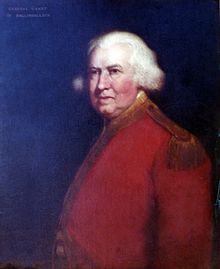James Grant (British Army officer)
| James Grant | |
|---|---|

Portrait of James Grant of Ballindalloch, circa 1770, currently held by the State Archives of Florida.
|
|
| Born | 1720 Ballindalloch, Scotland |
| Died | 13 April 1806 (aged 85–86) |
| Allegiance |
|
| Service/branch |
|
| Years of service | 1744–1805 |
| Rank | Major General |
| Commands held |
77th Regiment of Foot (1757–1763) 55th Regiment of Foot (1775–1791) 11th Regiment of Foot (1791–1796) |
| Battles/wars |
War of the Austrian Succession: French and Indian War, Battle of Fort Duquesne, Anglo-Cherokee War, Siege of Havana Battle of La Vigie |
| Other work |
|
War of the Austrian Succession: French and Indian War, Battle of Fort Duquesne, Anglo-Cherokee War, Siege of Havana
James Grant, Laird of Ballindalloch (1720–1806) was a major general in the British Army during the American War of Independence. He served as Governor of East Florida from 1763 to 1771.
Grant was born on the family estate of Ballindalloch in Banffshire in the Northeast of Scotland. He began his military career by purchasing a commission as captain in the Royal Scots on 24 October 1744. The regiment was shipped to the Continent and Grant fought with them in the Battle of Fontenoy.
By 1757, Grant was a major of the 77th Regiment of Foot (Montgomerie's Highlanders), fighting in the French and Indian War. In 1758, he led part of the regiment in an expedition led by General John Forbes. On this expedition, he became acquainted with others who would also play larger parts in the American Revolutionary War: George Washington, Francis Marion, and Hugh Mercer, among others. He also gained a contempt for the colonial or militia troops that would colour his later views.
In September, Grant was assigned to lead an advance part of around 800 men to determine the French strength at Fort Duquesne. The force was mainly made up of militia, but he took along a number of officers from the regulars, since he had little respect for the colonial troops. He then decided to split his force hoping to encourage a French attack that he could surprise and overwhelm. Having no wilderness experience, he was ambushed himself by Indians and French on 14 September 1758. At this engagement, the Battle of Fort Duquesne, the British force was repelled with 342 men killed, wounded or captured. The prisoners consisted of Major Grant and 18 of his men. He was paroled soon after, and tried to blame his defeat on the failure of the colonial militia to follow orders.
...
Wikipedia
